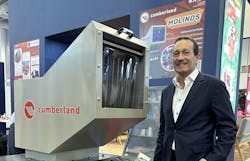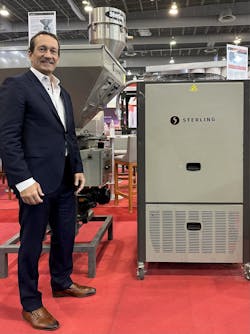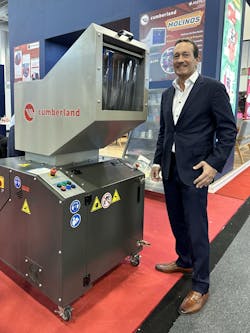Bob Deitrick overcomes early adversity to rise to role as VP for ACS
By Bruce Geiselman
Bob Deitrick, VP of sales for ACS Group, fulfilled his late father’s dying wish by joining the U.S. Navy out of high school. He studied electronics, including sonar technology, in Navy schools.
After leaving the military, he was recruited to join Measurex Inc., now a part of Honeywell, as a field engineer installing and maintaining measurement and control systems, including sensors used primarily in plastics and paper making. Eventually, he transitioned into sales and over the years worked for a number of companies including EGS Gauging, Nordson EDI and Graham Engineering, before joining ACS Group in July 2020.
The company’s brands include AEC and Sterling, which manufacture materials-handling, process-cooling, size-reduction, and temperature-control equipment; Cumberland, which manufactures granulators and shredders; and MiVue, which offers a manufacturing insight service that monitors AEC equipment to predict and prevent problems.
Deitrick recently spoke with Bruce Geiselman, senior staff reporter for Plastics Machinery & Manufacturing, about his career path, how he got involved in plastics machinery and auxiliary equipment, and why he took a year out of the workforce to pursue an MBA degree.
Where did you grow up?
Deitrick: I grew up near Erie, Pa. I was raised in a small grape-farming community called North East. I grew up in a town of about 4,500 people.
Where did you go to college and what degrees did you earn?
Deitrick: My undergraduate experience is a little nontraditional. I went into the military, right out of high school. My parents had been ill, and it was my father's dying wish when I was a senior in high school for me to go into the Navy and to follow the family tradition.
My father was in the Navy in World War II. My uncles followed his path in the Navy. One uncle, Jack, whom I very much admired, was a lieutenant commander in the Navy and served in the Korean and Vietnam wars.
My father was a blue-collar worker at the Electric Materials Company in North East [a manufacturer of electrical commutators, AC rotors, copper extrusions, forgings, and copper castings]. He believed that if you learned a trade that you could always take care of and support your family. I did three years of Navy school, and then after I got out [after six total years of service], I got hired by Measurex as a field engineer.
After being with Measurex a couple of years, I started going to night school, and none of my military credits transferred to college credits. I didn't get credit for any of the three years that I was in school in the Navy. I kind of had to start over and went through three or four years at night school pursuing a bachelor's degree in electrical engineering. Then, I finally convinced Measurex to give me a territory and became an area sales manager. I started traveling and making six figures and more, and a bachelor's degree no longer was required for me to succeed.
What did you study while in the Navy?
Deitrick: I joined the Navy in a program called the advanced electronics program. It is a six-year commitment versus a four-year commitment. In my job, I was a sonar technician.
With a background in electronics, what prompted you to get involved in sales?
Deitrick: I've always been a salesman at heart.
In my first job, when I was 8 years old, I sold greeting cards door to door, and then I worked for my family business. My sister and brother-in-law owned a grape farm and a nursery/greenhouse in North East. They also had retail stores. They had a Montgomery Ward's catalog store as well as an Agway (farm and garden equipment) store. I was always told that I'm a natural born salesperson.
How were you introduced to the plastics field?
Deitrick: Measurex was in the plastics and paper industry. They did online measurement control of the flat sheet industry for paper and all types of plastics.
I started out as a field engineer in a couple of paper mills — Stone Container in Uncasville, Conn., as well as Cellu Tissue in Hartford — and quickly got pulled into the plastics, where we were doing online measurement control of plastic film and sheet. The plastic portion was very interesting to me. Plus, there was more chemistry involved in plastics, and I was very much drawn to the engineering side of things.
I worked as a field engineer for about a year and a half, and then there was an opportunity to move out to Silicon Valley and to Cupertino (California), and to be an instructor and course developer. I wrote courses, and then taught six-week courses on how to install and maintain the software and understand the software and interpret it for the measurement control systems.
There was also sensor technology, which was quite interesting. You had nuclear, X-ray, color sensors, infrared shadow sensors, many different ones – a myriad offering of sensors that went with it, and it was online, so it would scan back and forth; it wasn't static, like in a laboratory.
You had to also understand the chemistry of the different types of plastics and how they would react to the different types of sensors and then go back into the process and control it. At Measurex, it was 24-hour uptime, and we had service contracts that guaranteed that kind of uptime. It was quite challenging, and I think it was very intellectually fulfilling.
Why did you leave Measurex, and how did you eventually end up at ACS Group?
Deitrick: When Honeywell acquired Measurex, the Honeywell culture was no longer conducive to the Measurex culture, which was cult-like in a good way. It was Silicon Valley, and everybody was working toward one goal: to increase shareholder value.
Honeywell was more of a modern-day corporate raider. They basically swept all the cash out of the accounts, sold all the properties that Measurex had, capped all the high earners, and tried to make you fit in a bucket. My entrepreneurial-type spirit didn't fit well with Honeywell culture.
I was offered an opportunity to work for Eurotherm Gauging Systems [EGS Gauging], and they were owned by Invensys at the time. We had an opportunity to do a management buyout. I knew that I wanted to get into some type of equity ownership.
When we did the management buyout of Eurotherm Gauging Systems, we created EGS Gauging. We were successful in growing that, doubling it in size, and then selling it to Thermo Fisher Scientific.
Then, after leaving Thermo Fisher, I had an opportunity to go to EDI, Extrusion Dies Industries. The ownership group at the time wanted me to come on to help them shape their sales force, gave me an equity position, and we were able to sell [the company] the first time in 12 months. After that, we sold it again in another 18 months to Nordson with an equity position again. Extrusion Dies Industries is a great company. My wife, Kelly, works there today.
Then I had the opportunity to be the global vice president of sales for Graham Engineering, where we sold blow molding equipment, sheet lines, as well as extruders and medical tubing lines. I did that for five years, more than doubled that company, and had an equity position. As soon as I exited Graham Engineering, my wife talked me into going back for my master's degree. I'd always wanted to get my master's degree, not having achieved a formal bachelor's degree. I took a year off, we took an apartment in Cambridge, Mass., and I attended Hult International School of Business. Having an advanced degree was always a personal goal.
What attracted you to the plastics industry?
Deitrick: Honestly, I fell into it. But once I got into it, I found it extremely fulfilling intellectually because there's so much to learn and so many different types of processes, whether it's a more basic application, like a sheet line, or you go into more challenging applications, like tandem extrusion coating or biax [biaxially oriented] film. These processes are extremely challenging, large investment applications. They’re $50 million plus lines that you're working with, and understanding the nuances of different types of plastics, with the different types of machinery and how they work and how they interact, I found it very fulfilling.
How did you end up as VP of sales at ACS after earning your master’s degree?
Deitrick: ACS had started to recruit me before I started my master’s, and I'd already signed up.
I started as the vice president of sales for the New Berlin [Wisconsin] business, which was AEC, Cumberland, Sterling, and then after six months, I took on all the brands, Wabash, Carver, Sterling and MiVue.
What have you found most rewarding about your career?
Deitrick: What's most rewarding about my career is the intellectual aspect of learning all the different nuances and different types of technologies, as well as my customers’ applications. I'm not an expert in my customers’ applications, but I've learned a great deal in how to look at every customer challenge or customer problem as an opportunity to solve, and to provide the best solution for my company to offer, as well as impeccable service. I'm talking about full customer service. I found that very rewarding. Also moving from a direct sales role to a manager to a vice president, where you're running a more than $100 million organization and trying to be the best leader and the most inspirational leader that I can be.
What do you see as your greatest career accomplishment?
Deitrick: I think my greatest accomplishment is where we took companies that were not profitable . … One of the things that I've done at ACS is we've transformed the sales team into delivering results for our customers and for our shareholders to help bring the company into double-digit profitability, as well as growing the top-line revenue to record numbers in the past three years.
What explains the strong sales?
Deitrick: During COVID, an incredible amount of new capacity came online. There were so many new machines — injection molding machines, extrusion machines, blow molding machines — that came into the market, both replacing old technology, as well as adding capacity. It's been something I've never seen in my 30 years of plastics. It's the best market that I've ever seen.
With that, we're the auxiliary supplier to all different types of plastics and other processes, including composites.
What have been the most significant changes or improvements to the plastics auxiliary equipment that you've seen?
Deitrick: When it comes to the auxiliary equipment, the robustness of the equipment is very important. One thing that ACS with AEC, Cumberland and Sterling really focuses on is longevity. Some of our size-reduction equipment, grinders and shredder offerings have been in the market for more than 20 years, and we can still do rebuilds on them, along with our other equipment like temperature-control units and chillers.
In the early years in business, who was your mentor? Who did you admire and why?
Deitrick: In my early years of business, I relied on my modeling from my brother-in-law. My father passed early, and my brother-in-law kind of stepped in. His name was Gordy Luke, and his integrity resounded through me in the rest of my career. [He taught me] that your word and who you are as a person matters more than being successful financially. My sister, Joyce, was like my second mother and best friend.
When it comes to industry mentors, I would say that some of my early sales managers, Duke Nelson was a good mentor for sales from Measurex. There’s just, there's so many people that had a positive influence on my life and my career. There are too many to mention.
Do you want to share any more about how your father passed away and the role your brother-in-law played?
Deitrick: My mother and father were ill for a lot of my childhood. When I was 8 years old, my father was a volunteer fireman. He was on his way to an accident when he was hit by a train. He was in the hospital for a couple of months. Then it took him a couple of years of convalescing before he was able to go back to work.
Right when my father got back to work, my mother had a brain aneurysm followed three days later by massive strokes and was incapacitated to where she was in the hospital for a couple of years until she moved back into the house with us. My younger brother and I were still in the house. I have two older sisters that had already married and out of the house. We took care of my mother, who had the mind of a 10-year-old for the rest of her life.
As I started to get into high school, my father contracted cancer. We didn't know what type of cancer it was, and he finally succumbed to cancer during my senior year of high school. It was his dying wish, on his deathbed, for me to go into the military, which is why I took that path rather than going to college right away. My goals were just to go to college, but as you can imagine, with sick parents, there were no finances to go to college right away. I wanted to fulfill my father's dying wish.
My brother-in-law kind of stepped in as my father was ill. I worked for my sister and brother-in-law from sorting tomatoes as a kid when we were unpaid to being paid at 9 or 10 years old to work in the greenhouse and then eventually the Agway and Montgomery Ward stores, as well as working on the farm. And we did a lot in the grape vineyards driving a tractor and caring for the vines and learning about grape harvesting and production.
My brother-in-law was always there teaching me about retail business and about life. Joyce, my sister, was my second mother, and Gordy was my second father. They pretty much raised me.
What are your hobbies?
Deitrick: My wife and I are very much into fitness.
My wife is an avid cyclist, which I appreciate as well. I was a marathon runner and have switched over to low-impact exercise, but we try to get an hour and a half of cardio every day as well as weightlifting.
To try to keep our sanity, we try to go to Aruba quite often. We have another trip to Aruba coming up after Thanksgiving. Then, we'll go again in April. We go for a couple of weeks once or twice a year.
My wife, Kelly, is an executive in the plastics industry as well, and when we travel as much as we do it helps us reconnect and stay head over heels in love with each other.
JUST THE FACTS
Who is he: Bob Deitrick, VP of sales for ACS Group
Education: U.S. Navy Advanced Electronics Program, 1987; Master of Business Administration degree, Hult International Business School, Cambridge, Mass., 2020
Years in the plastics industry: 30
Age: 57
Company headquarters: New Berlin, Wis.
Employees: 400 globally.
Sales staff and sales representatives: More than 150
About the Author
Bruce Geiselman
Senior Staff Reporter Bruce Geiselman covers extrusion, blow molding, additive manufacturing, automation and end markets including automotive and packaging. He also writes features, including In Other Words and Problem Solved, for Plastics Machinery & Manufacturing, Plastics Recycling and The Journal of Blow Molding. He has extensive experience in daily and magazine journalism.


